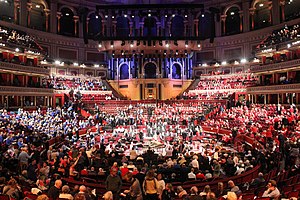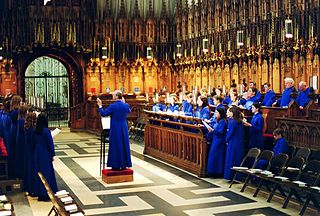
A choir, also known as a chorale or chorus is a musical ensemble of singers. Choral music, in turn, is the music written specifically for such an ensemble to perform or in other words is the music performed by the ensemble. Choirs may perform music from the classical music repertoire, which spans from the medieval era to the present, or popular music repertoire. Most choirs are led by a conductor, who leads the performances with arm, hand, and facial gestures.
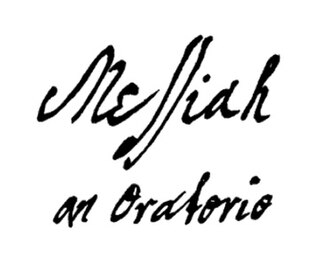
Messiah is an English-language oratorio composed in 1741 by George Frideric Handel. The text was compiled from the King James Bible and the Coverdale Psalter by Charles Jennens. It was first performed in Dublin on 13 April 1742 and received its London premiere a year later. After an initially modest public reception, the oratorio gained in popularity, eventually becoming one of the best-known and most frequently performed choral works in Western music.
The BBC Symphony Chorus is a British amateur chorus based in London. It is the dedicated chorus for the BBC Symphony Orchestra, though it performs with other national and international orchestras.

The Harvard–Radcliffe Collegium Musicum is a mixed chorus at Harvard University, composed of roughly 50 voices from undergraduate and graduate student populations. Founded in 1971 to coincide with the coeducational merger of Harvard and Radcliffe College, Collegium drew from members of the Harvard Glee Club and the Radcliffe Choral Society to form a smaller mixed group that could represent Harvard on tours. Although Collegium used to perform primarily early Renaissance music, its repertoire now draws from centuries of a cappella and orchestral selections. Together with the (tenor-bass) Harvard Glee Club and the (soprano-alto) Radcliffe Choral Society, it is a member of the Harvard Choruses.
Finchley Children's Music Group (FCMG) is a UK youth choir based in North London for children aged 4 to 18.
Saint Peter's Singers (SPS) is a chamber choir associated with Leeds Minster, Leeds, West Yorkshire, England that celebrated during the Season 2017/2018 the fortieth anniversary of the choir's formation by Harry Fearnley in 1977. An anniversary concert took place at Leeds Minster on Sunday 25 June 2017 with the National Festival Orchestra and soloists Kristina James, Joanna Gamble, Paul Dutton and Quentin Brown. Further anniversary year events included Bach Cantatas and Music for Christmas at Fulneck Church in August and December respectively, Handel Coronation Anthems at Holy Trinity, Boar Lane as part of the Leeds Handel Festival in September and a tour of East Anglia in October. In November at Leeds Town Hall, the Singers participated in Herbert Howells's masterpiece Hymnus Paradisi with Leeds Philharmonic Chorus and Leeds College of Music Chorale under the direction of Dr David Hill with the Orchestra of Opera North. 2018 began with a concert of Sacred Choral Masterworks at Leeds Town Hall in February and Bach's Mass in B minor at Leeds Minster on Good Friday 2018 in memory of long-serving member Jan Holdstock. The final concert of the current season takes place at Leeds Minster on Sunday 24 June at Leeds Minster at 5.30. At this event will be presented the first performance of a new work from composer Philip Moore commissioned for the Singers' 40th anniversary – the motet Tu es Petrus – along with music by E W Naylor, Arvo Part, Sir Hubert Parry, Judith Bingham and Maurice Durufle.
There have been three choirs named The BBC Chorus in the history of the British Broadcasting Corporation.
- Today's BBC Symphony Chorus. Founded in 1928 as the BBC National Chorus, it changed its name to the BBC Chorus in 1932, before changing it again in 1935 to the BBC Choral Society.
- A 42-strong professional chorus developed in the 1930s. It would perform either alone or with the BBC Choral Society as a "choir within a choir". It was abolished in 1961 following changes to the BBC's choral structures.
- Today's BBC Singers. Founded in 1924 as a 16-strong BBC Wireless Chorus, and formally renamed The BBC Singers in 1935, it was expanded to 28 in 1961 and renamed The BBC Chorus as part of reforms to the BBC's choral set-up. It was then renamed The BBC Singers once more in 1972.

Masterworks Chorale is a choral ensemble based in San Mateo, California.
Royal Melbourne Philharmonic (RMP) is a 120-voice choir and orchestra in Melbourne, Victoria, Australia. It was established in 1853, and is reportedly Australia's oldest surviving cultural organisation. The Royal Melbourne Philharmonic is Australia's oldest musical organisation that has been continuously existing for over 150 years. Among its programmes, there have been large-scale concerts celebrating classical composers including Bach, Mendelssohn and Beethoven. The Royal Melbourne Philharmonic is managed under the direction of Andrew Wailes, the artistic director of the orchestra.
The Vancouver Cantata Singers (VCS) is an auditioned Canadian choir in Vancouver, British Columbia, founded in 1959 by organist and conductor Hugh McLean.
Bath Bach Choir, formerly The City of Bath Bach Choir (CBBC), is based in Bath, Somerset, England, and is a registered charity. Founded in 1946 by Cuthbert Bates, who also became a founding father of the Bath Bach Festival in 1950, the choir's original aim was to promote the music of Johann Sebastian Bach via periodic music festivals. Bates – an amateur musician with a great love and understanding of this composer's works – was also the CBBC's principal conductor and continued in this role until his sudden death, in April 1980. This untimely exit pre-empted his planned retirement concert performance of J. S. Bach's Mass in B minor, scheduled for July of the same year, and effectively ended the first period of the choir's history.

The Canberra Choral Society (CCS) is an auditioned symphonic choir in Canberra, Australia. The choir is known both for traditional choral repertoire, and new music.
The Really Big Chorus (TRBC) is Britain's largest choral society, made up of singers from hundreds of different choirs all over the UK as well as thousands of individuals. It was founded by Don Monro, an Electrical Engineering lecturer at Imperial College, just opposite the Royal Albert Hall.
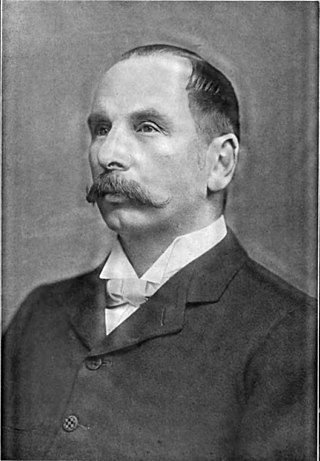
Bristol Choral Society is a large mixed-voiced choir based in Bristol, England, founded in 1889. As of 2002, it is conducted by Hilary Campbe, it has around 140 auditioned members. The choir stages at least three concerts annually at the Bristol Beacon in Bristol with professional orchestras and soloists, and another annually at Bristol Cathedral in addition to other performances and broadcasts in Bristol and further afield.
The Royal Scottish National Orchestra Chorus, or RSNO Chorus for short, is a choir based in Scotland and founded in 1843. Its main role is to perform alongside the Royal Scottish National Orchestra. The chorus holds open rehearsals for potential new members, rehearses on Wednesdays in Glasgow, and has also toured around the world. It is directed by Gregory Batsleer.
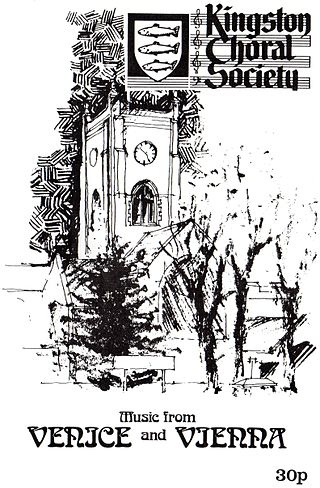
Kingston Choral Society is a large mixed-voice choir based in Kingston upon Thames in the UK. Originating in 1949, the choir in 2016 had around 140 auditioned members. It stages four concerts each year with professional musicians and soloists. Most of these concerts are held at All Saints Church, Kingston upon Thames, at St Andrew's Church, Surbiton, or at Cadogan Hall in central London.

Camarata Music Company, now known as Camarata Music, is an international non-profit music organization in Seoul, South Korea. It was created for both native Koreans and foreign expatriates. Camarata currently consists of five musical ensembles: the Camarata Chorale, Camarata Chamber Singers, Camarata Junior Choir, Camarata Youth Choir, and Camarata Orchestra. Camarata Music is currently led by its founder and Music Director, Dr. Ryan Goessl. To date, Camarata has performed over 300 concerts since its founding. It has members from more than 106 countries.

The Foundling Hospital Anthem, also known by its longer title "Blessed are they that considereth the poor" [sic], is a choral anthem composed by George Frideric Handel in 1749. It was written for the Foundling Hospital in London and was first performed in the chapel there. Handel wrote two versions, one for choir only and one for choir and soloists. Composed 10 years before his death, it was Handel's last piece of English church music.
St Albans Bach Choir is an amateur choir based in the English cathedral city of St Albans. Since its founding in 1924 it has performed a wide range of choral music including but by no means limited to the great Bach masterpieces. It strives for the highest possible standards of music making, employing soloists of the highest calibre and professional orchestras. Performances are normally held in St Albans Cathedral. Currently, the Musical Director is William Fox, Director of Music at the Cathedral.
A virtual choir, online choir or home choir is a choir whose members do not meet physically but who work together online from separate places. Some choirs just sing for the joy of the shared experience, while others record their parts alone and send their digital recordings, sometimes including video, to be collated into a choral performance. There may be a series of rehearsals which singers can watch online, and their performance recordings may be made while watching a video of the conductor, and in some cases listening to a backing track, to ensure unanimity of timing. The worldwide COVID-19 pandemic in 2020 inspired a large growth in the number of virtual choirs, although the idea was not new.
